Volume 3, Issue 95: Hummingbird
"The gray fountain spray of the great Milky Way would never let him die alone."
Here is a button where you can subscribe to this newsletter now, if you have not previously done so. I do hope that you enjoy it.
The holidays are many things, but perhaps more than anything else, they are exhausting. The month of December is a relentless dead sprint, an overwhelming flurry of activity and responsibilities, from gift shopping, to finishing up every work loose end, to holiday parties, to the children being out of school for winter break, to travel, to seeing family and all that comes with that. It is madness. This is why I’ve always considered the stretch between December 26 and January 2 the one true vacation I get every year. It’s always when I watch TV shows I never got around to, or cull my closet for clothes to give to Goodwill, or finally whittle down that stack of New Yorkers in the corner of my office. Every minute until December 26 is chaos. That next week is required, just to recover.
Which is why I wasn’t surprised or overly concerned last year when my wife spent most of the week after Christmas in bed. It had been a long, hard Christmas in 2020—you don’t need me to tell you that. This household was particularly drained. The election and its aftermath had worn on everyone, and considering the runoffs here in Georgia coming shortly after the new year, it was far from over. We’d hosted my parents and her mother, along with two other friends, for Christmas, which required constant testing and vigilance in the days and weeks beforehand. (And the usual careful navigation during.) On Christmas Night, after everyone was in bed, a confused elderly man showed up on our doorstep asking if I could help him find his son’s house, a house, it turned out, was in a town 35 miles away. (He didn’t have a GPS in his car, so I spent Christmas night having him follow me all the way out there, in a rainstorm, as I spoke to him on a phone he wasn’t entirely sure how to use.) My mother-in-law’s dog unexpectedly died the day after Christmas. It was a lot. It would put anyone to bed for a while.
But she was unusually waylaid (though she still ran, like, 20 miles that week), and she also had a bit of a head cold, and, now that you mention it, that candle next to the bed has a lot fainter smell than it did yesterday. Because I was so worried about my parents, I was getting tested weekly at the time—the Georgia Department of Health has had plenty of issues during the pandemic, but free, easily scheduled and administered testing was readily available—so even though we were sure she didn’t have Covid (we couldn’t come up with a place she would have gotten it from), I went ahead and booked her a test for the next day, December 29, the day before I had a test of my own already scheduled. By the next day, she was feeling fine, which made sense: We were sure she didn’t have Covid, after all. But we went ahead and got the test anyway.
I woke up at 5 a.m. the next morning, New Years Eve morning, and did my requisite doomscrolling, as was customary at the time. Because I’d set up the test, I received an email alert that her test results were in. I’d taken literally dozens of tests at this point, and the same black Negative had appeared each time I put in my test number. I typed in hers.
It was a red Positive. I had to look at it five or six times to make sure I wasn’t hallucinating it. I paced around my office for an hour before she woke up. What do I tell her when she wakes up? I need to call my parents and her mom and our friends. I need to get the boys—oh no, the boys—tested. Was there anyone else she had seen in the last week? Also … I guess this means I probably have Covid too? I’d worn a hole in my office carpet long enough that she ducked her head in the room to find out what was going on. Five minutes later, she went back to the bedroom and shut the door.
We immediately scheduled a test for the boys through their pediatrician so we could get the results faster, so I spent the day with them downstairs while their mother was upstairs. We went on walks, we played basketball in the backyard, I scheduled tests for my parents and her mother, the boys got the big Q-tips stuck up their nose, I refreshed the page to try to find out my own results from the day’s test before, we watched some football, Wynn fell asleep on my chest. At 8 p.m. I put them to bed, yelled goodnight to my wife upstairs and poured myself basically a pitcher’s worth of bourbon. That was my New Years Eve, watching Anderson and Andy ring in the new year, drinking, refreshing, worrying, trying to figure out how any year could possibly be worse than 2020.
At 12:09 a.m., January 1, 2021, the results came in: The familiar black Negative. You couldn’t help but chuckle.
The next morning, after I made the boys breakfast, there was a buzzing in the other room. I had gotten the boys walkie talkies for Christmas, a gift that had suddenly come very much in handy for a family that had an upstairs section for people who had Covid and a downstairs section for people who didn’t. I picked up my device. My wife’s voice crackled through: “The boys’ tests are in.”
I walked them to the edge of the stairs. “William is … Negative.” We were 2-for-2. Was her a test a false positive? Were we so worried for no reason? Then: “Wynn is … Positive.” Wynn, six years old and scared of absolutely nothing, looked at me and threw his arms in the air. “Mommy!” And then he sprinted into her room, and then they were up there for two weeks.
*************
We were lucky—so damned lucky. My parents and her mother were all negative, as were our friends: It turned out to just be my wife and Wynn. (It’s a weird little virus.) My wife felt better almost immediately, and Wynn never had a single symptom; he just got to have his mom all to himself. William felt equally blessed. He spent a near full fortnight getting to stay up late eating terrible food with his dad and playing NBA2K for so many more hours than he’d ever be allowed otherwise. (He kicked my ass, actually.) But it was so surreal and awful, in a way all of 2020 was surreal and awful. In addition to the walkie talkie, we had a bell that either Wynn or my wife would ring when they were ready for dinner, or finished and had set their plate by the door. (I joked at the time that my job for that fortnight was to be Nervous Butler, and I’ve decided “The Nervous Butlers” will be the name of every fantasy team of mine from now on, now that I can’t call them “The Woody Allens” anymore.) Even though we tested negative, because of our exposures, William and I couldn’t see anyone other than each other, though my parents did come by our house and we’d shout to them from the window. The boys would have whole conversations, mostly about poop and farts, on the walkie talkies.
On my last day of quarantine, my father had a long-scheduled major sinus surgery, and when they got home, my mom called me. “I need to get his medicine, but I’d rather not leave him here by himself, he’s really groggy, can you come by?” I sighed, put on three different n95 masks and drove over. He sat on one side of the room and I sat on the other and we watched, me aghast and Dad mercifully heavily medicated, as thousands of people stormed the Capitol building in an attempt to overturn the results of an American presidential election. I learned later than back home, my son William had been watching downstairs, all alone, crying.
And I mostly remember feeling furious—no, helpless. This virus, that had traveled the whole world but had up to that point had not been a part of this house, was inside the throats and lungs and bodies of people I loved. My sweet little six-year-old, a virus that had killed hundreds of thousands of people and would kill hundreds of thousands more, that virus was in him. I had been unable to protect him from it. It made me feel like a horrible father, and made me want to find all the people who had made so many terrible decisions that had made it that much more difficult to protect him, and the rest of us, from it … it made me want to smash in their brains with a polo mallet with as much force as I could muster. Wynn was fine, my wife was fine, the rest of my family was safe (and also all knew that vaccines were imminent), and that was a relief. But it had made it into my home. I hadn’t kept it out. I hadn’t kept them safe. I knew this wasn’t a logical thought process, and considering the direction the virus and its variants have taken in the last year, it looks increasingly naive. But a year ago, it was all I could think about, as a father, a husband, a son, a citizen: I have failed them.
We were all OK. Everyone ended up safe. But I’ll never forget that feeling.
And now we approach the next Christmas, after the worst Christmas. So much has happened. My parents and mother-in-law will be at this Christmas, but now they come with armed with a life-saving vaccine and subsequent boosters; my sister and her husband will be here this year too, armed with the same. My children are three weeks out from their second shots. We have done all we can do to protect ourselves and the people around us. This Christmas also comes with it another wave, the Omicron wave, one that is terrifying everyone I know in New York City—a place I just left, a place teeming with lines to get into CityMD spreading around the block—and one that surely brings with it more global misery but also one that, thanks to those life-saving vaccines and boosters, also brings with it less threat to those able and willing to protect themselves against it. I know that it is frustrating to feel, a year later, that we are back in the same place. But we are not: We’re not in the same place. Where we are is better. Last year’s Christmas was full of despair, fury, worry and powerlessness. This year, it might not be perfect—it might be far from it—but it is better. We have made progress. We have moved forward.
And we can all continue to. This Christmas, we’ll be together, and we will have protection, and we will have spent a year having parts of our lives that were taken from us in 2020 returned to us. We have seen friends, we have traveled, we have cheered on our sports teams, we have gone to the movies, we have met co-workers, we have sat across from people we deeply care about and were without for too long, we have dared to dream of having our lives be our own again. It has been rocky—it will continue to be rocky. But I am not going to allow the current fears to make me forget how, thanks to science and diligence and well-meaning people who are doing the right thing, and thanks to our own resilience, life has improved.
Which means it can keep doing so. There is darkness in the horizon: Life is forever full of loss. But life is also about moving forward, and doing your best to leave the world a little better than you found it. This Christmas isn’t going to be like last year’s. I have not been too battered by the world, too weary from fear, not to be eternally grateful for that, and for all of it. I’m just grateful. I hope that, this holiday season, you’re able to find yourself in a position to be grateful as well.
Here is a numerical breakdown of all the things I wrote this week, in order of what I believe to be their quality.
Everybody Loves Steph, New York. Just beyond cool that I got to be at Madison Square Garden for this moment on Tuesday.
The Ongoing Sacrifice of the Elderly, Medium. When in doubt, just add a bunch of Roger Angell quotes to your column.
Steven Spielberg Movies, Ranked and Updated, Vulture. Updated with West Side Story.
2021 Was Better Than 2020, Medium. Small hill to climb, but still.
Your Friday Five List For December 13-17, Medium. My way to slide into the weekend.
PODCASTS
The Long Game With LZ and Leitch, discussing Stephen Curry, Tiger Woods and remembering “The Decision” with special guest Michelle Beadle.
Grierson & Leitch, discussing “West Side Story,” the truly terrible “Don’t Look Up” and the very good “Red Rocket.”
Waitin' Since Last Saturday, no show this week.
LONG STORY YOU SHOULD READ THIS MORNING … OF THE WEEK
“Johnny Cash Was Not a Politician,” Chris Lehmann, The New Republic. The quest to make artists into Important Political Figures—to flatten them so they fit in The Discourse—is a very dumb thing we do now, and Lehmann does a good job wrestling with this while writing about a new biography of Johnny Cash.
Also, going back into the archives, if you’re an Esquire subscriber—and I know we’ve all got a lot to subscribe to, but it’s well worth it—you can read this classic piece by Eve Babitz, about dating Jim Morrison, about how he went off the rails, about all of it, from way back in 1991. Babitz died yesterday, at the age of 78, and she lived one of the most fascinating lives you can imagine … and was fortunate to have the perfect chronicler of that life: Herself.
Also—lots of good stuff this week!—my friend and editor David Wallace-Wells has some tentatively very encouraging Omicron analysis. (I think we could use some.)
ONGOING LETTER-WRITING PROJECT!
This is your reminder that if you write me a letter and put it in the mail, I will respond to it with a letter of my own, and send that letter right to you! It really happens! Hundreds of satisfied customers!
Write me at:
Will Leitch
P.O. Box 48
Athens GA 30603
CURRENTLY LISTENING TO
“Wherever I Fall,” The National. I have been a longtime skeptic of The National, for reasons I really can’t put a finger on: They’ve just never quite been my jam. This is in spite of the fact that there are several people whose music judgment I generally find impeccable absolutely swearing by them—speaking to me so rapturously about them that it seems impossible that I am not wrong. Anyway, I’m giving them a full run now thanks to their soundtrack to the new movie Cyrano, starring Peter Dinklage, Haley Bennett and Kelvin Harrison Jr. The movie is good, not great, but good, featuring a fantastic Dinklage performance and a big sweeping emotional spirit that’s difficult to resist. The songs are mostly fine, but there’s one, called “Wherever I Fall,” that knocked me over so much that I am now absolutely certain I was wrong about The National. It’s during a moment in the film when soldiers are about to go to war, and it’s clear, to them and the audience, that they’re walking into certain death. Three soldiers—including one played by Once’s and The Frames’ Glen Hansard, whose voice has never made me not want to cry—sing about the letters they are writing to their loved ones, their last words on this earth: One writes to the wife and sons he’s leaving behind, one writes to a girl who he loved but never told so, one writes to a father who was cruel but whom he loved anyway. It just a completely devastating song—it just waylaid me. It was a relief to research the song—which is not available on YouTube yet, which is why I’ve linked above to a good but not as good song from the soundtrack—and learn that the band itself believes that “Wherever I Fall” is “timeless” and “one of the strongest songs we’ve written in our career.” If there are any National obsessives out there who want to make me a must-listen playlist, I’m now very much amenable do it. And you can listen to “Wherever I Fall” on Spotify, right here.
Remember to listen to The Official Will Leitch Newsletter Spotify Playlist, featuring every song ever mentioned in this section.
It’s basketball season again. Friend, Friend, Son Who Plays, Son Who Mascots:
Have a great weekend, all. We’ll be back on Christmas Day and New Years Day, but they’re the year wrap-up editions: The best movies of the year next week, and the annual Best Stuff I Wrote This Year piece on January 1.
Be safe out there. I’m totally lost without you.
Best,
Will



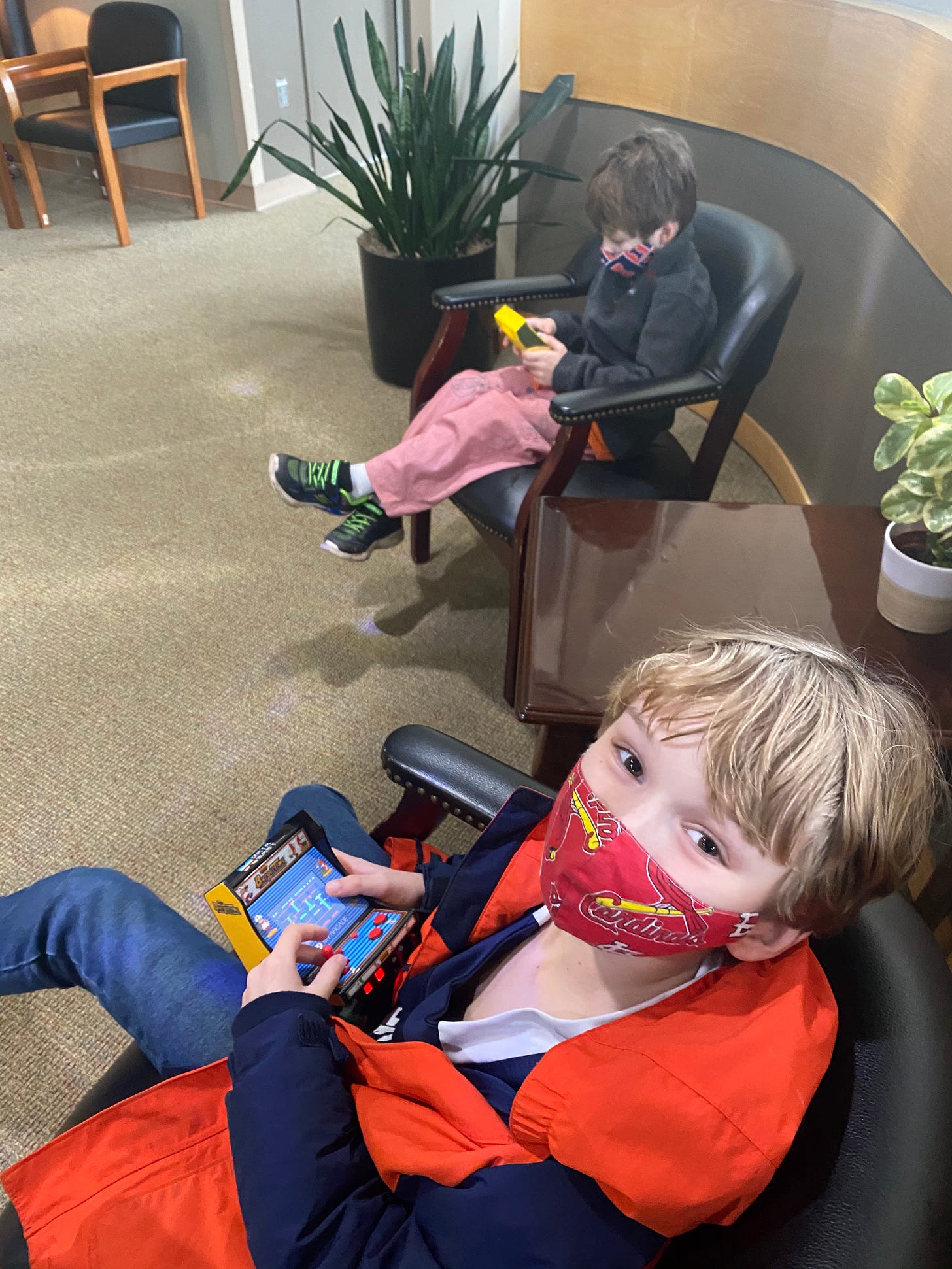
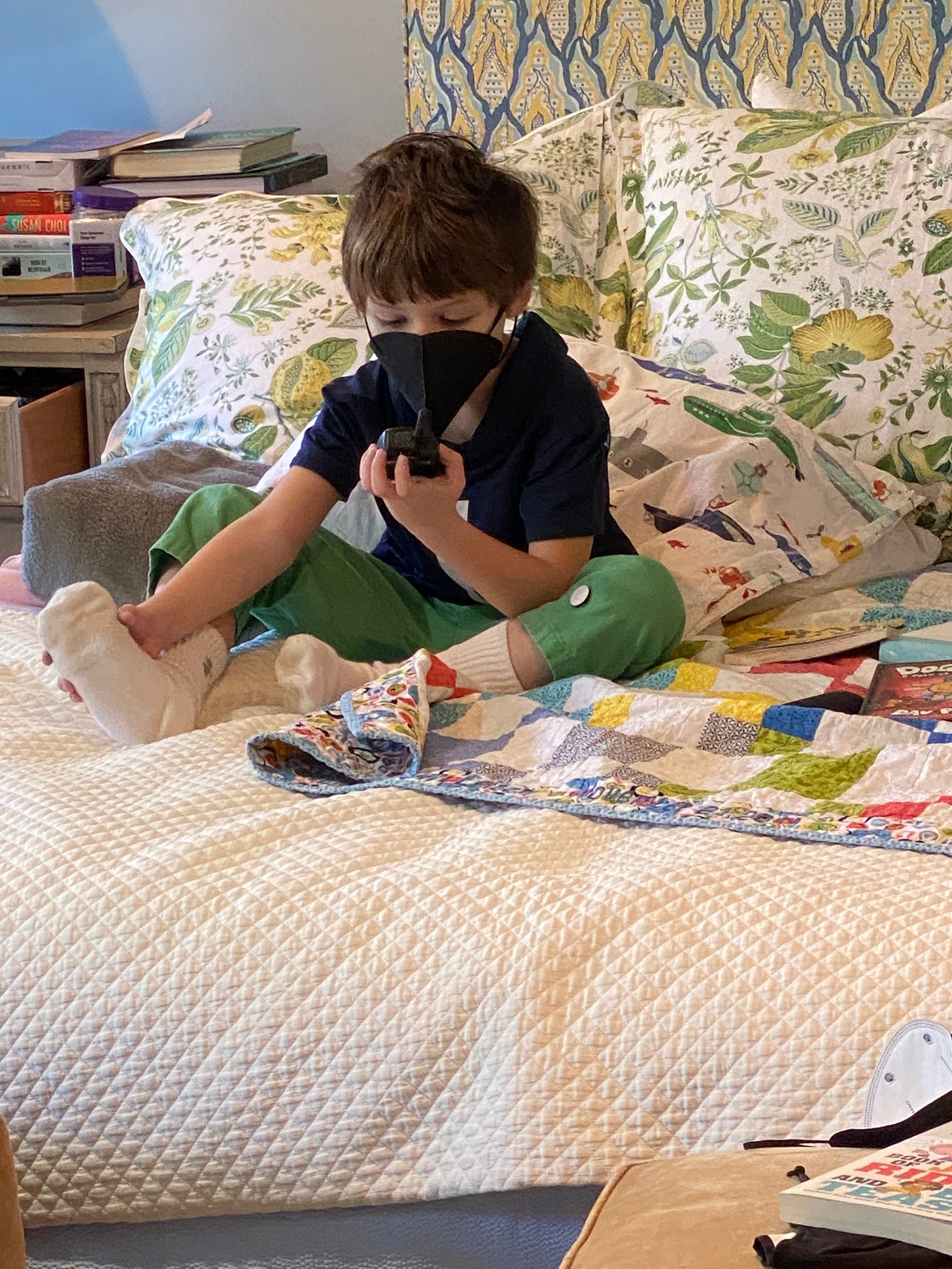
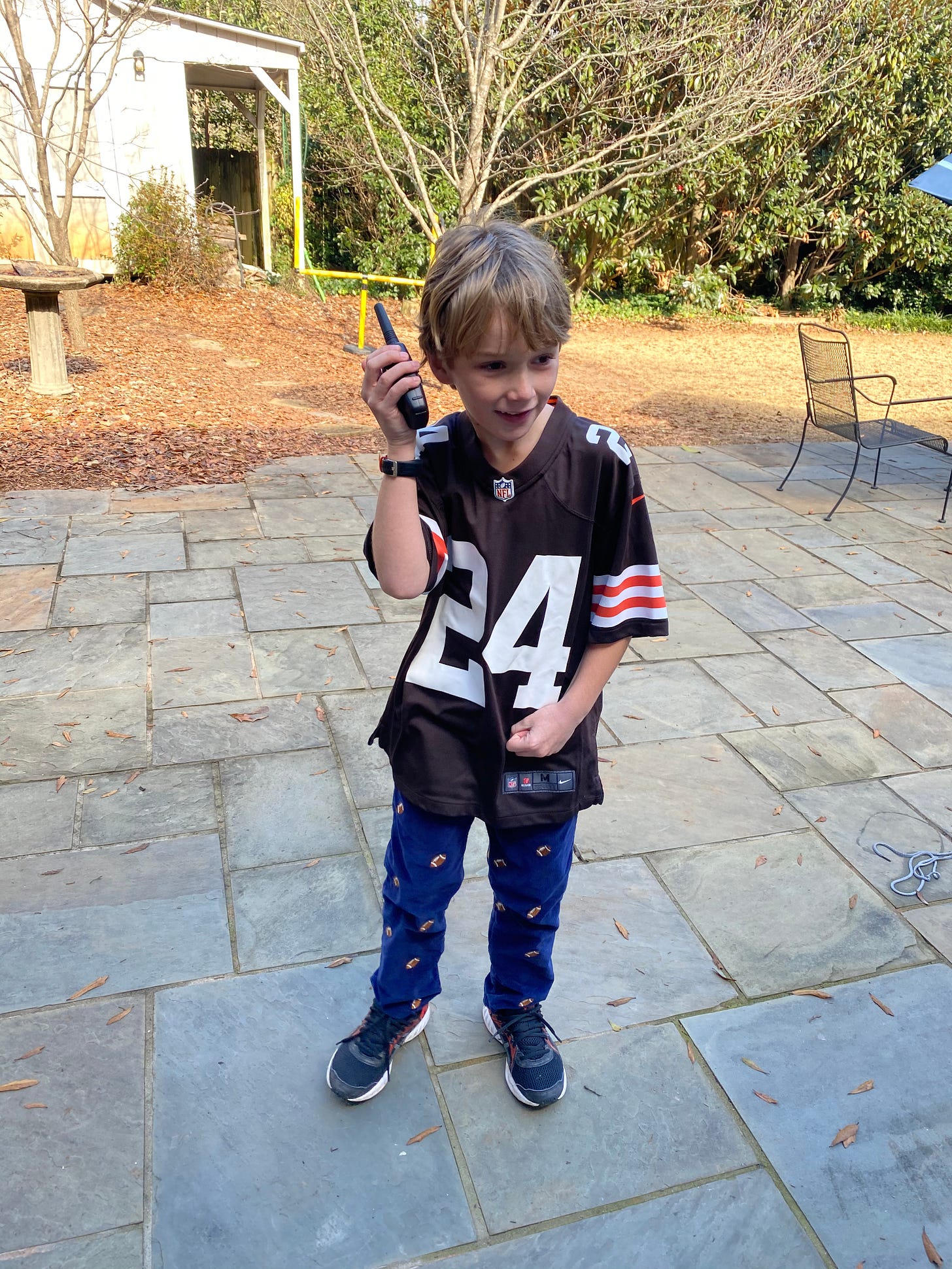
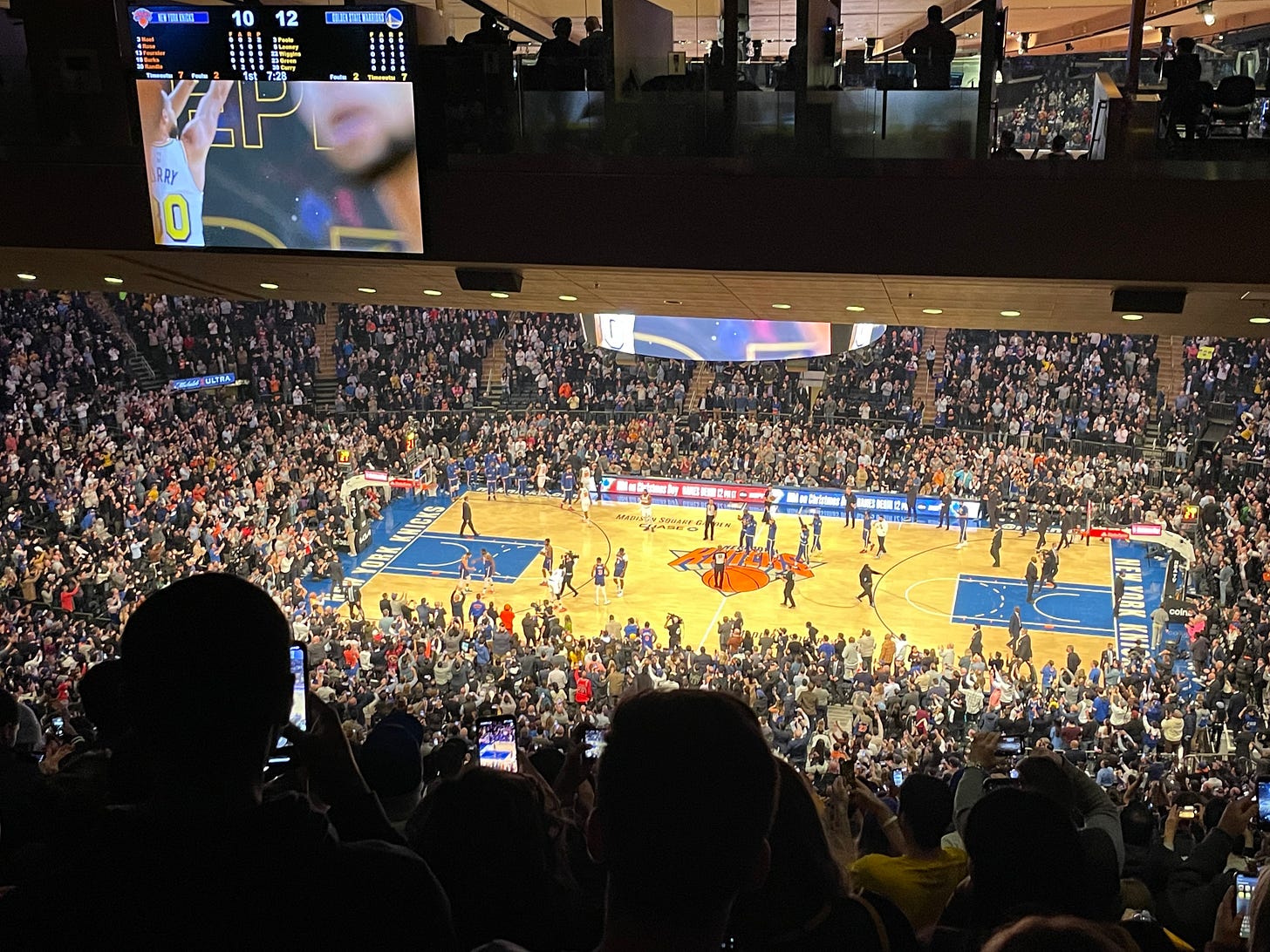
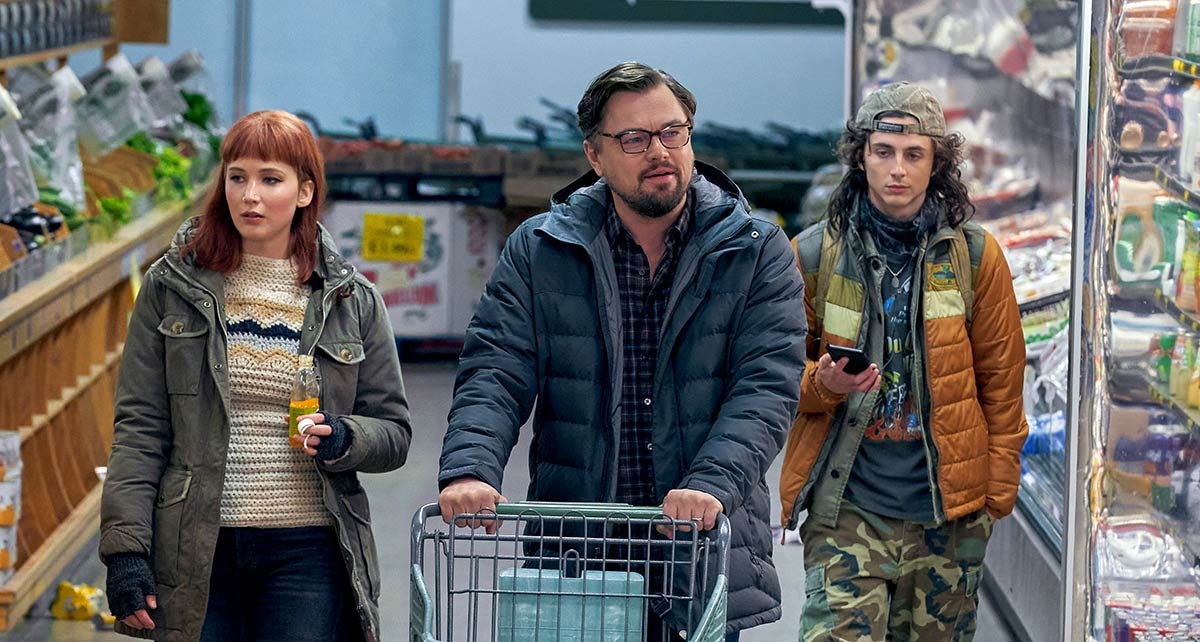

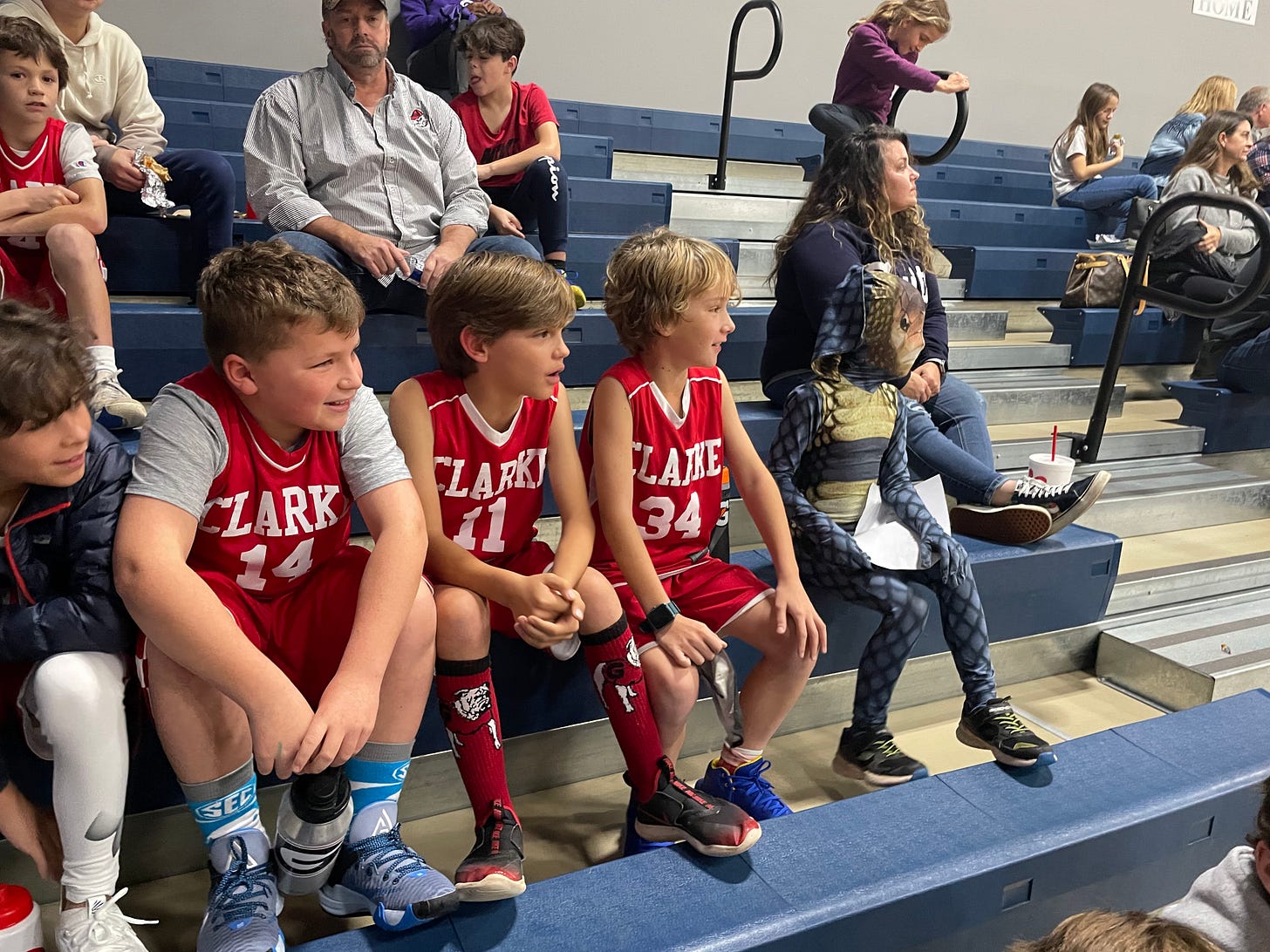
Have a safe and wonderful holiday. Say hi to Dad!
Right on point, as usual. I’m still pissed i didn’t take typing in high school…